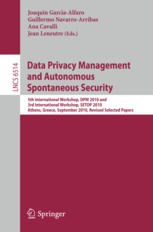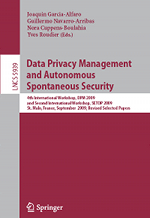Keynote Speakers
Claudia Diaz
Affiliation: Katholieke Universiteit Leuven, BE
Title: A closer look at cloaking techniques for location privacy
Abstract: There is a rich collection of literature that aims at protecting the privacy of users querying location-based services. One of the most popular location privacy techniques consists in cloaking users' locations such that k users appear as potential senders of a query, thus achieving k-anonymity. We discuss the effectiveness of k-anonymity approaches for protecting location privacy in the presence of various types of adversaries. The unraveling of the scheme unfolds the inconsistency between its components, mainly the cloaking mechanism and the k-anonymity metric. We show that constructing cloaking regions based on the users' locations does not reliably relate to location privacy, and argue that this technique may even be detrimental to users0 location privacy. The uncovered flaws imply that existing k-anonymity scheme is a tattered cloak for protecting location privacy.
George Danezis
Affiliation: Microsoft Research, UK
Title: Privacy preserving smart-metering
Abstract: Metering consumption and billing has been a traditional reason to collect, process and store detailed records. Proposed business models and government practices, such as electronic road tolling, pay-as-you-drive-insurance, smart-grids for electricity and even virtualised computing and storage, rely on charging users using even more fine grained information than ever before for their usage and consumption. This is at odds with the privacy consumers have been accustomed to. Current implementation proposals require huge databases of personal information to be built -- we show that these are not necessary.
We present protocols for metering and fine grained billing that do not require the collection, processing or storage of personal information. We focus on the example of smart-grids to show how meter readings can be cryptographically transformed by users' devices to apply a tariff policy, and produce a bill for the utility companies. Using Zero-knowledge techniques our protocols perfectly hide all privacy sensitive information, while protecting the integrity of the bills. We also discuss practical deployment issues and 3 implementations providing different trade-offs in speed, scalability and software correctness.
Gildas Avoine
Affiliation: Universite Catholique de Louvain, BE
Title: Privacy Challenges in RFID
Abstract: Radio Frequency Identification (RFID) allows to identify and authenticate objects or subjects without any physical nor optical contact, using transponders - micro-circuits with an antenna - queried by readers through a radio frequency channel. This technology is one of the most promising of this decade and is already widely used in applications such as access cards, public transportation, payment cards, and passports. This success is partly due to the steadily decrease in both size and cost of passive transponders called tags.
The shared enthusiasm for RFID makes people think that everything is do-able with any kind of RFID, especially with low-cost tags. Reality is a bit different. In particular, the characteristics of this technology - ubiquity, low-resource, wireless - open a security breach that should be seriously considered.
After a brief introduction about the technology, we will focus in this talk on the security threats. We will propose a classification and show that victims are not only the end-users but they can also be the systems' owners. We will see what is possible today in terms of security and what are the challenges we have to address. Among others, we will consider the following topics: impersonation, privacy, denial of service.




